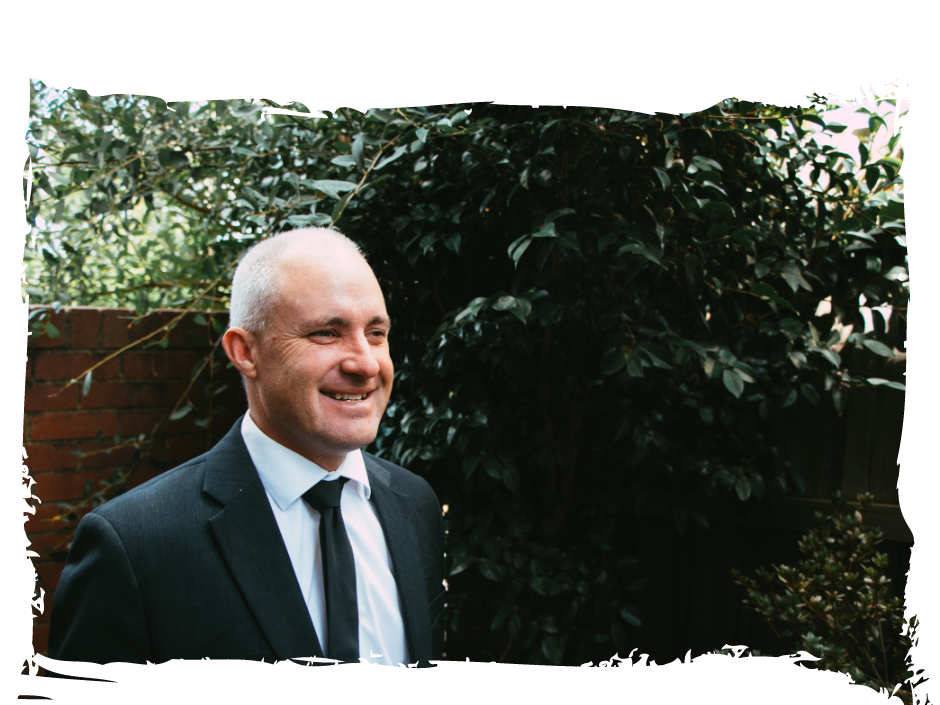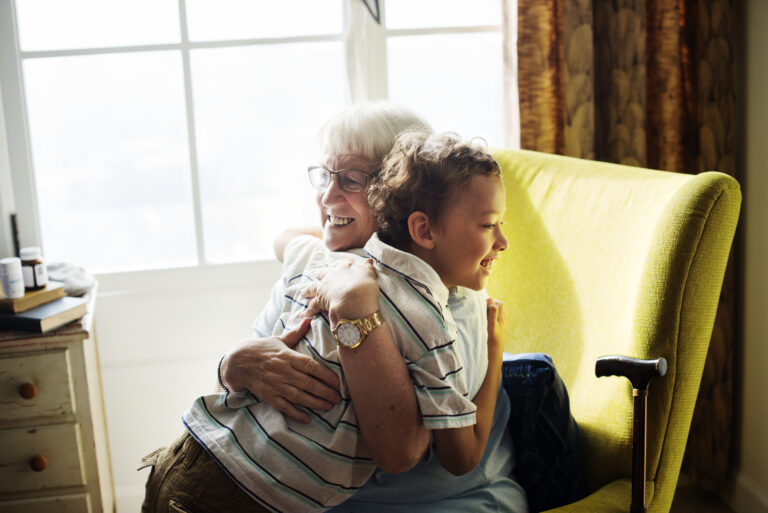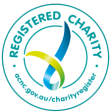
Michael Cooper spent 10 years in prison and now works in criminal and family law. We caught up with him recently to learn more about his journey.
Tell me about your family, Mike – do you have siblings?
I grew up with two brothers and a sister. But our family was a lot bigger than just us 4. We had about 100 foster kids through our home from before I was born to when I left for uni at 18 years old. Some of these kids only stayed for a few weekends, but some stayed for a few years.
That sounds like a lot for a young kid to handle. What was it like sharing your home and your family with all the other kids?
It was an interesting situation. There were generally about 10 kids in the house at any one time. We were always looked after and cared for, and I had my siblings, but building a strong sense of family was tough. It was an awesome childhood in many ways – we grew up on a lake, so we were always outside, sailing, yachting, on motorbikes, horse-riding, throwing mud at each other – but it did take its toll.. It took a long time to process all of that, and I didn’t really process it until I was in prison.
‘I don’t believe in just good and bad – it’s not that simple. People are both, we’re not one or the other. The only choice is whether you accept Jesus or not. If you reject him you’re lost.’
How did you process and heal in prison?
I was lucky. One of the chaplains who visited me in prison, Ron, was a former psychologist. He gave me a lot of help to understand my experiences, process my childhood, and heal from that. My parents were amazing and did what they did with the very best intentions, but taking on all the issues of these troubled kids did cause a lot of harm to me and my siblings.
In prison, you really have the time and space to dig deep and think about things. With Ron’s help, I was able to reflect on my childhood and try to understand why I made certain decisions, how I really felt, and what my coping strategies were. At the core of it, I was asking myself, ‘What am I really doing? Where is the truth in all of this?’
You mentioned ‘certain decisions’ – what are you referring to?
I had been violent and was charged with violent offences. As kids, we unknowingly took on a lot of the foster kids’ problems, and we didn’t process it. The turmoil and damage it created was huge. When I was 15 I found out that some of my cousins had been abused by their father. No one did anything about it and I couldn’t understand why he never received any justice or punishment for the trauma he’d inflicted on his own children. A big part of me accepted right then that the only way to have justice was to carry it out yourself.
Then when I was 18, I moved out to live at my university, and things went downhill. The same year, one of the kids who had stayed with our family for almost ten years committed suicide. Things really started to crack then, and I just didn’t process it. I was drinking heavily and taking a lot of drugs. I was looking to those substances to give me answers. But all the answers I was looking for were really found in thinking about what I was doing, and how I fit into the world and into God’s cosmos.
Life was complicated even further when two young children came forward and told my mum that they were being abused. I decided to take justice into my own hands and I beat up the two guys involved from what I had been told. I went to prison for that when I was 22 – I was 6 weeks away from joining the army when I was arrested. I received 10 and a half years, with a non-parole period of 8 years.
What was it like walking into prison knowing you had 10 years ahead of you in that place?
I remember walking down the spine – a big corridor in a Victorian maximum security prison – and I felt like someone had just taken the wind out of me. It suddenly hit me that the next 7 years of my life would be spent here. The gravity of it just hit me out of nowhere and I could hear God talking to me. He said, ‘You can choose violence, or you can choose peace.’ At that moment, I made a choice and surrendered to God. I said, ‘I recognise that you’re bigger and there’s much more to this life than violence. I’ve seen the result of violence and I choose peace.’

So God was part of your story at the beginning of your sentence?
Well, before then, really. As a kid growing up in a Christian home, I always knew God was there, but I never really had or understood a relationship with our Father, the Creator. During my sentence, the Holy Spirit really reached into my life and gave me the space I needed. Jesus transformed my heart and is transforming my mind. I remember being able to barely hold a conversation for 2 minutes because of the drugs. My cognition was so poor. But as I had time away from all that and time with God, it changed. Each morning in prison, I would take out my Bible and read a passage. I remember one day I just said to God, ‘Look, if you’re really real, give me an opportunity. I could run a great drug trade in this prison, but if you want me to do something else, just give me an opportunity and I’ll do it.’ About a week later, one of the chaplains came along and enrolled me in an International Relations university course. It really felt like that was God answering my prayer. I felt Him say, ‘It’s going to be really difficult.’ And it was! But he didn’t say no.
Where did Prison Fellowship come into your story?
Prison Fellowship played a massive role in my life. I may not have appreciated it at the time, but I can see now how important it was to my journey. Particularly in the really intense prisons. There were quite a few Prison Fellowship volunteers who were happy just to chat with me about life and my coursework. They’d come in and sit down with us. They had no agenda, and in prison, everyone has an agenda. The guards are the enemy and you build friendships with some of the inmates, but you never fully trust them. But the volunteers who came in to visit us were like a neutral party – they weren’t going to report anything we said. Our conversations were built on trust. I remember we could complain about the guards and it never came back to bite us. They gave me the stepping stones and the sense of hope that I wasn’t able to find for myself. It’s a really powerful testament for you guys to be going in there and doing God’s work, and just letting the inmates know that people do care about them.
What was it like to have these volunteers visiting you regularly?
The chaplains were pivotal in providing a space for me to talk out loud and process some things instead of them just sitting in my head. If there’s one thing I could say about Prison Fellowship volunteers, it’s that they’re in a position to bring hope into a very hopeless, dark place. If you’re left to your own devices in prison it can be very destructive. Prison Fellowship’s presence in prison is crucial to the well-being and outcome of inmates’ lives. Even for those inmates who don’t have much to do with them personally, it still makes a difference.
As an example, George and Mim Lee were amazing – the lives they touched, just through a teddy bear-making class! A lot of people just warmed to them, they were so well-liked. They’re amazing people. Every Prison Fellowship volunteer I’ve met just treats us with humanity.
What about when things felt too much in prison?
Whenever things were hard and I’d struggle to see the light at the end of the tunnel, I’d just ask God for help, I’d pray and ask, plead with Him, to show me the way through. I would read the Bible and every day God would give me a word to meditate on for the day. I’d write it out and carry it in my pocket to meditate on it for the whole day. You have to have faith and trust – you have to trust. He wants us to be showered with his good gifts, and he’s above all. That story of Gideon was with me the whole time in prison. The odds of getting out of prison, intact, with a good perspective, and going on to build a good, healthy, safe life were insurmountable. I read Gideon’s story and I just wanted to be like him, or Joshua, or Caleb, and just say, ‘Alright, I’m trusting you, God.’

What was it like when you were finally released?
For a few weeks after my release, I stayed with my brother. But I was committed to finding my feet on my own. I found a job as a welder and a place to live. Eventually, I met my wife and we now have two kids, and I ended up being able to practice law. I couldn’t have done any of that without God. The Prison Fellowship volunteers were so crucial to finding those stepping stones out of prison and into a good life on the outside.
Did you find a welcoming church community?
Yeah, I did! I went along to Bridge Church in Richmond and I met with the team there. I told them my whole story, and it didn’t faze them. It was really restorative for me. That acceptance in that community was really important – the church was pivotal as a support network, to being needed in life. I think everyone needs to feel a sense of belonging, of being needed. Being part of a church gives us this sense of being part of something, of being in relationship with God and with other believers.
Apart from Gideon’s story, is there a story from the Bible that you particularly relate to?
I always swore when I was younger that I’d never be the Prodigal Son, but I relate to that story so much now. But it’s just this amazing story of the father welcoming his son with open arms. It’s an incredible love story where the son is welcomed back no matter what. There’s a lot of forgiveness. I made a lot of mistakes in my early life, and my crimes were very violent. I don’t shy away from that. On this path back, this transformation of my mind and my understanding, my Father in Heaven really shows me what to work on and what to focus on. Before I started practising law I started a tree-lopping business. I’d get to Sunday each week and have no work for the week ahead, so I’d pray and ask for work, and then by Sunday night I’d have a full week or two of work. He just answers prayer, sometimes in a way you don’t expect. Guaranteed, He will come through, even if it’s at the last second.
What are you doing for work nowadays?
I’m a family and criminal lawyer in Melbourne. It wasn’t what I had planned, but God had his say and it worked out for the better. God really opened a lot of doors to becoming a lawyer as an ex-prisoner. It was a pretty intense experience. They basically held a trial and tried to needle me to figure out who I really was and whether I was suitable to be a lawyer. This was only 18 months after finishing my sentence, so I think they just wanted to have some more time to sus me out. Eventually, they accepted me and I’ve been practicing law ever since. It’s a real blessing to be able to help people. I feel called to be in people’s lives and help them. For better or worse I keep feeling called back to family and criminal law.






